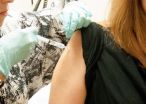INFORMATION:
NOTES TO EDITORS:
* Quote direct from author and cannot be found in text of Commission
[1] The UK and Finland are the only countries out of the pre-2004 EU member states (Austria, Belgium, Denmark, Finland, France, Germany, Greece, Ireland, Italy, Netherlands, Portugal, Spain, Sweden, UK) where liver disease prevalence is increasing.
[2] https://www.gov.uk/government/news/phe-launches-local-authority-liver-disease-profiles
The Lancet: Leading medical experts call for an end to UK postcode lottery for liver disease treatment and detection
2014-11-27
(Press-News.org) Leading medical experts today [Thursday 27 November] warn that rising numbers of deaths from liver disease - already the UK's third commonest cause of premature death - will be unavoidable without radical improvements in treatment and detection services, and tougher government policies to control the excessive alcohol use and obesity responsible for much of the national burden of liver disease.
In a major new Lancet Commission, led by Professor Roger Williams, Director of the Institute of Hepatology, London, UK, doctors and medical scientists from across the UK call for a radical scale up of liver disease treatment and detection facilities in the country, which has one of the worst rates of death from liver disease in Europe.
The UK is the only country in western Europe (except Finland) [1] where the prevalence of liver disease has increased in the past three decades, and the rate of death from the disease for those under the age of 65 years has increased by almost 500% since 1970.
"There is a human, social, and financial imperative to act now if the UK's burden of liver disease and all its consequences are to be tackled and the NHS is not to be overwhelmed by the cost of treating advanced stage liver disease,"* says Professor Williams.
Although 1 in 10 people in the UK will experience liver disease at some stage in their lifetime, the Commission shows that nationally, early detection of liver disease through primary care services (such as GPs and walk-in centres) is virtually non-existent, despite the fact that the disease is much more effectively treated when identified early.
As a recent Public Health England (PHE) report showed [2], the burden of liver disease in different regions of the UK is closely linked to socioeconomic deprivation, with areas such as the north west of England experiencing nearly four times as many deaths from liver disease as more affluent areas.
Despite the fact that these regions experience a far greater burden of death and illness from liver disease, the Commission shows that specialist treatment services for liver disease in its advanced stages are unevenly distributed throughout the UK, with some of the regions most badly affected having inadequate specialist provision, leading to a postcode lottery for patients which is resulting in unacceptable rates of death and illness in many regions of the UK.
As well as improving treatment and detection services, the Commission demonstrates that a powerful commitment is needed from UK policymakers to implement policies which address the lifestyle factors leading to most death and illness from liver disease, especially excessive alcohol use and obesity. This includes recommendations to implement minimum pricing policies for alcohol, prominent health warnings on alcohol packaging, and regulation of sugar content in food and soft drinks.
The Commission provides a cost-effective and achievable blueprint for improving hospital care for people with severe liver disease, by recommending that Liver Units providing acute services are established in every District General Hospital in the UK, linked with 30 Specialist Centres - for more complicated cases - distributed equitably around the country. Screening of high risk individuals using new diagnostic techniques are part of proposed improvements at GP and community level. The authors also recommend a review of the transplant services to ensure better access for patients in some areas of the country, and to ensure sufficient capacity for an anticipated 50% increase in availability of donor organs by 2020.
Although the report highlights shortcomings of the current national provision for liver disease in adults, it shows that UK services for childhood liver disease -including genetic disorders or viral infection - could, in terms of their centralised funding and organisation, provide a positive example for improving adult services.
The report also suggests that another major cause of liver disease, hepatitis C, could be eliminated from the UK by 2030, now that safe and highly effective antiviral drugs are available. The spread of hepatitis B also needs to be controlled, with monitoring of immigrants from countries with high prevalence of the infection bringing new infections into the country a priority.
According to Professor Williams, "This Commission builds on recent work by the All Party Parliamentary Group on Hepatology and Public Health England, amongst others, to clearly identify the scale of the problem posed by liver disease in the UK, and current deficiencies in NHS care provision. The evidence outlined in the report, contributed by some of the UK's leading experts in the field, should leave nobody in any doubt about the present unacceptable levels of premature death and the overall poor standards of care being afforded to liver patients."*
"The good news is that if our recommendations - many of which will require additional government regulatory action - are followed, deaths from liver disease will fall, with profound benefits in health and social wellbeing and economic productivity, as well as reduced costs for the NHS. However, the health and policy reforms we are recommending need to take place now - the scale of the problem is too great for it to take second place to short-term political considerations."*
ELSE PRESS RELEASES FROM THIS DATE:
Two studies identify a detectable, pre-cancerous state in the blood
2014-11-27
Boston, MA. Wednesday, November 26, 2014 -- Researchers from the Broad Institute of MIT and Harvard, Harvard Medical School, and Harvard-affiliated hospitals have uncovered an easily detectable, "pre-malignant" state in the blood that significantly increases the likelihood that an individual will go on to develop blood cancers such as leukemia, lymphoma, or myelodysplastic syndrome. The discovery, which was made independently by two research teams affiliated with the Broad and partner institutions, opens new avenues for research aimed at early detection and prevention of ...
Nervous system may play bigger role in infections than previously known
2014-11-27
TORONTO, Nov. 26, 2014--The nervous system may play a bigger role in infections and autoimmune diseases than previously known. If researchers can learn more about that role, it could provide insight into diagnosing and treating everything from the stomach flu to rheumatoid arthritis.
Researchers at St. Michael's Hospital in Toronto, in conjunction with the Feinstein Institute for Medical Research in Manhasset, N.Y., reviewed the latest, most vigorous pre-clinical trials on this topic in a commentary published Wednesday (Nov. 26) in the New England Journal of Medicine. ...
NIAID/GSK experimental Ebola vaccine appears safe, prompts immune response
2014-11-27
An experimental vaccine to prevent Ebola virus disease was well-tolerated and produced immune system responses in all 20 healthy adults who received it in a Phase 1 clinical trial conducted by researchers from the National Institutes of Health. The candidate vaccine, which was co-developed by the NIH's National Institute of Allergy and Infectious Diseases (NIAID) and GlaxoSmithKline (GSK), was tested at the NIH Clinical Center in Bethesda, Maryland. The interim results are reported online in advance of print in the New England Journal of Medicine.
"The unprecedented scale ...
Heat-conducting plastic developed at U-Michigan
2014-11-26
ANN ARBOR--The spaghetti-like internal structure of most plastics makes it hard for them to cast away heat, but a University of Michigan research team has made a plastic blend that does so 10 times better than its conventional counterparts.
Plastics are inexpensive, lightweight and flexible, but because they restrict the flow of heat, their use is limited in technologies like computers, smartphones, cars or airplanes--places that could benefit from their properties but where heat dissipation is important. The new U-M work could lead to light, versatile, metal-replacement ...
Study: Most people with dementia never have screening
2014-11-26
MINNEAPOLIS - The majority of people with dementia have never seen a doctor about their memory and thinking problems, according to a new study published in the November 26, 2014, online issue of Neurology®, the medical journal of the American Academy of Neurology.
In the study, 55 percent of the people with dementia had never had an evaluation of their thinking and memory skills with a doctor.
"These results suggest that approximately 1.8 million Americans over the age of 70 with dementia have never had an evaluation of their cognitive abilities," said study author ...
Why do so many seniors with memory loss and dementia never get tested?
2014-11-26
ANN ARBOR, Mich. -- Despite clear signs that their memory and thinking abilities have gone downhill, more than half of seniors with these symptoms haven't seen a doctor about them, a new study finds.
University of Michigan researchers and their colleagues say their findings suggest that as many as 1.8 million Americans over the age of 70 with dementia are not evaluated for cognitive symptoms by a medical provider, which in some patients can lead to a failure to uncover modifiable causes of thinking or memory impairment.
The study, published online in Neurology, the ...
Follow-up on psychiatric disorders in young people after release from detention
2014-11-26
Juvenile offenders with multiple psychiatric disorders when they are incarcerated in detention centers appear to be at high risk for disorders five years after detention, according to a report published online by JAMA Psychiatry.
Psychiatric disorders are prevalent among juvenile detainees. However, far less is known about the young people after they leave detention.
Karen M. Abram, Ph.D., of the Northwestern University Feinberg School of Medicine, Chicago, and co-authors looked at patterns of comorbidity (the presence of two or more disorders), how they change over ...
TGen-Luxembourg scientific team conducts unprecedented analysis of microbial ecosystem
2014-11-26
FLAGSTAFF, Ariz. -- Nov. 26, 2014 -- An international team of scientists from the Translational Genomics Research Institute (TGen) and The Luxembourg Centre for Systems Biomedicine (LCSB) have completed a first-of-its-kind microbial analysis of a biological wastewater treatment plant that has broad implications for protecting the environment, energy recovery and human health.
The study, published Nov. 26 in the scientific journal Nature Communications (DOI: 10.1038/ncomm6603), describes in unprecedented detail the complex relationships within a model ecosystem.
The ...
Trial shows new imaging system may cut x-ray exposure for liver cancer patients
2014-11-26
Johns Hopkins researchers report that their test of an interventional X-ray guidance device approved by the U.S. Food and Drug Administration in 2013 has the potential to reduce the radiation exposure of patients undergoing intra-arterial therapy (IAT) for liver cancer.
In a report prepared for presentation Dec. 3 at the 100th annual meeting of the Radiological Society of North America in Chicago (abstract #SSM24-02), the researchers described the results of a clinical trial of the imaging system AlluraClarity, made by Philips Healthcare, on 50 patients with liver cancer. ...
DNA may survive suborbital spaceflight, re-entry
2014-11-26
Plasmid DNA attached to the outer surface of a sounding rocket may be able to withstand rocket launch, a period of residence in suborbital space, re-entry, and landing conditions into the Earth's atmosphere, all the while staying intact and active in its function as carrier of genetic information, according to a study published November 26, 2014 in the open-access journal PLOS ONE by Cora Thiel and Oliver Ullrich from University of Zurich and colleagues.
DNA plays an important role as a biomarker for the search of extraterrestrial signatures of life, and scientists are ...


